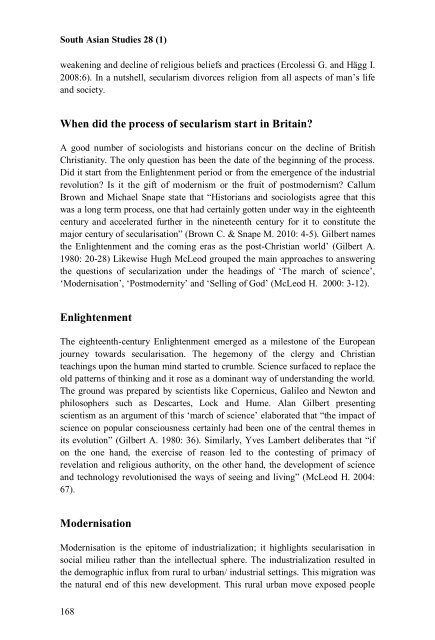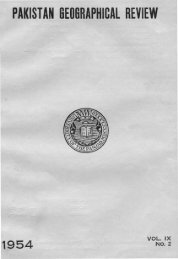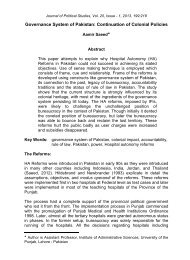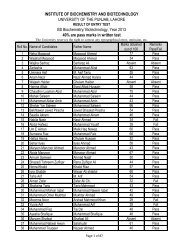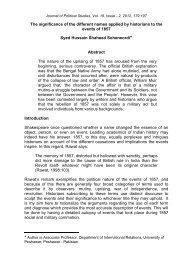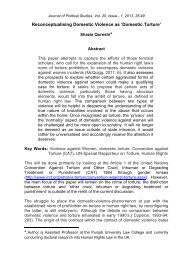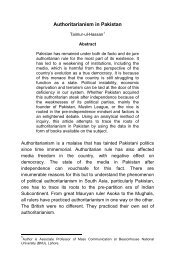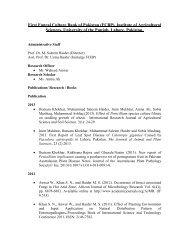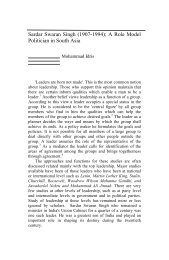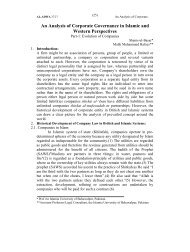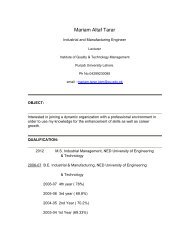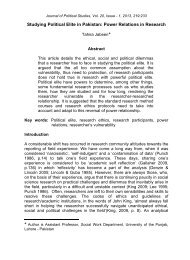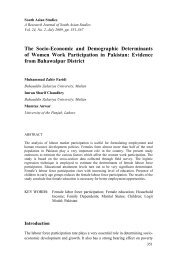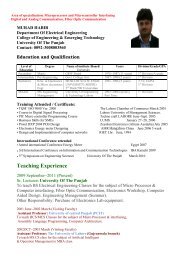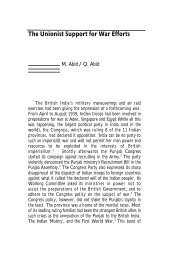Can Pakistan be a Secular State? - University of the Punjab
Can Pakistan be a Secular State? - University of the Punjab
Can Pakistan be a Secular State? - University of the Punjab
You also want an ePaper? Increase the reach of your titles
YUMPU automatically turns print PDFs into web optimized ePapers that Google loves.
South Asian Studies 28 (1)<br />
weakening and decline <strong>of</strong> religious <strong>be</strong>liefs and practices (Ercolessi G. and Hägg I.<br />
2008:6). In a nutshell, secularism divorces religion from all aspects <strong>of</strong> man’s life<br />
and society.<br />
When did <strong>the</strong> process <strong>of</strong> secularism start in Britain?<br />
A good num<strong>be</strong>r <strong>of</strong> sociologists and historians concur on <strong>the</strong> decline <strong>of</strong> British<br />
Christianity. The only question has <strong>be</strong>en <strong>the</strong> date <strong>of</strong> <strong>the</strong> <strong>be</strong>ginning <strong>of</strong> <strong>the</strong> process.<br />
Did it start from <strong>the</strong> Enlightenment period or from <strong>the</strong> emergence <strong>of</strong> <strong>the</strong> industrial<br />
revolution? Is it <strong>the</strong> gift <strong>of</strong> modernism or <strong>the</strong> fruit <strong>of</strong> postmodernism? Callum<br />
Brown and Michael Snape state that “Historians and sociologists agree that this<br />
was a long term process, one that had certainly gotten under way in <strong>the</strong> eighteenth<br />
century and accelerated fur<strong>the</strong>r in <strong>the</strong> nineteenth century for it to constitute <strong>the</strong><br />
major century <strong>of</strong> secularisation” (Brown C. & Snape M. 2010: 4-5). Gil<strong>be</strong>rt names<br />
<strong>the</strong> Enlightenment and <strong>the</strong> coming eras as <strong>the</strong> post-Christian world’ (Gil<strong>be</strong>rt A.<br />
1980: 20-28) Likewise Hugh McLeod grouped <strong>the</strong> main approaches to answering<br />
<strong>the</strong> questions <strong>of</strong> secularization under <strong>the</strong> headings <strong>of</strong> ‘The march <strong>of</strong> science’,<br />
‘Modernisation’, ‘Postmodernity’ and ‘Selling <strong>of</strong> God’ (McLeod H. 2000: 3-12).<br />
Enlightenment<br />
The eighteenth-century Enlightenment emerged as a milestone <strong>of</strong> <strong>the</strong> European<br />
journey towards secularisation. The hegemony <strong>of</strong> <strong>the</strong> clergy and Christian<br />
teachings upon <strong>the</strong> human mind started to crumble. Science surfaced to replace <strong>the</strong><br />
old patterns <strong>of</strong> thinking and it rose as a dominant way <strong>of</strong> understanding <strong>the</strong> world.<br />
The ground was prepared by scientists like Copernicus, Galileo and Newton and<br />
philosophers such as Descartes, Lock and Hume. Alan Gil<strong>be</strong>rt presenting<br />
scientism as an argument <strong>of</strong> this ‘march <strong>of</strong> science’ elaborated that “<strong>the</strong> impact <strong>of</strong><br />
science on popular consciousness certainly had <strong>be</strong>en one <strong>of</strong> <strong>the</strong> central <strong>the</strong>mes in<br />
its evolution” (Gil<strong>be</strong>rt A. 1980: 36). Similarly, Yves Lam<strong>be</strong>rt deli<strong>be</strong>rates that “if<br />
on <strong>the</strong> one hand, <strong>the</strong> exercise <strong>of</strong> reason led to <strong>the</strong> contesting <strong>of</strong> primacy <strong>of</strong><br />
revelation and religious authority, on <strong>the</strong> o<strong>the</strong>r hand, <strong>the</strong> development <strong>of</strong> science<br />
and technology revolutionised <strong>the</strong> ways <strong>of</strong> seeing and living” (McLeod H. 2004:<br />
67).<br />
Modernisation<br />
Modernisation is <strong>the</strong> epitome <strong>of</strong> industrialization; it highlights secularisation in<br />
social milieu ra<strong>the</strong>r than <strong>the</strong> intellectual sphere. The industrialization resulted in<br />
<strong>the</strong> demographic influx from rural to urban/ industrial settings. This migration was<br />
<strong>the</strong> natural end <strong>of</strong> this new development. This rural urban move exposed people<br />
168


